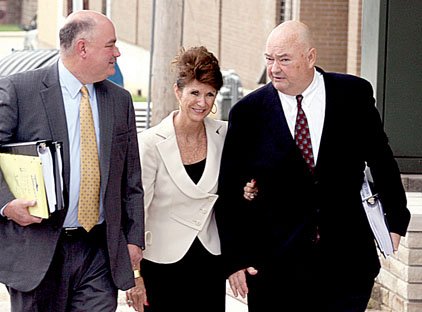BENTONVILLE - Wal-Mart Stores Inc. will pay former Vice Chairman Tom Coughlin $6.75 million to end a three-year legal battle over a $17 million retirement package, a Securities and Exchange Commission filing shows.
Wal-Mart settled its 2005 lawsuit with Coughlin on Thursday about 30 minutes before jury selection in the lawsuit was to start in Benton County Circuit Court.
The terms of the settlement are under seal for 20 days,but the SEC filing states that Coughlin will forgo all rights and claims under the retirement agreement that was reached weeks before Coughlin was charged with stealing from the retailing giant.
Wal-Mart spokesman Daphne Moore wouldn't say why the company filed the report Thursday after the settlement was reached. But the filing was made under a category used as a way a company can report events it considers of importance to stockholders.
The settlement exceeds the$4 million Coughlin earned in salary and benefits in 2005 as the No. 2 man at Wal-Mart. In his 27 years with the company, he rose through the ranks under the tutelage of founder Sam Walton and helped shape the company from a regional discounter to the biggest corporation in the world.
Tim Brooks, an attorney for Coughlin, said Thursday that the settlement includes a payment to Coughlin, but he wouldn't say how much.
"He was excited about going to trial and looked forward to his day in court," Brooks said of Coughlin, who retired in 2005 and was convicted the next year of embezzling from the company.
Wal-Mart sued Coughlin to stop him from collecting the retirement package after accusinghim of the embezzlement.
Wal-Mart said Coughlin had a duty to disclose that he was stealing from the company when it gave him the package, but Coughlin contended that a clause in the contract released both sides from "claims known and unknown."
Jury selection was to begin Thursday before Circuit Judge Jay Finch, but attorneys spent the morning negotiating in private.
Coughlin, 59, and his wife, Cynthia, waited in the courtroom, which was closed to the public before the hearing began.
Coughlin looked relaxed with his suit jacket off, but his face was pale and puffy. He has a history of heart problems and diabetes and is recovering from double-knee replacement.
The settlement was announced around 12:30 p.m. - about 30 minutes before 50 prospective jurors were to reportfor jury selection.
The Coughlins left the courthouse arm in arm without commenting to reporters.
Brooks said settlement negotiations had been ongoing for some time but they recently picked up.
Either side could have opted for the settlement to be private, but they agreed "it would be better to make it public," he said.
"Everyone agreed on the 20 days to provide a little time between now and then," he said.
Wal-Mart spokesman Moore said, "We are satisfied that the settlement is fair to both parties and are ready to put this one behind us." She declined any further comment.
Patricia Edwards, a retail analyst in Seattle for investment firm Wentworth, Hauser & Violich, said before the SEC filing was made that the money involved in a settlement is likely insignificant to Wal-Mart, which reported a $12.73 billion profit for fiscal2008, which ended Jan. 31.
Even the full amount of Coughlin's retirement benefits, she said, was "the batting of an eyelash, and it's money that would have already been accrued."
Wal-Mart, she said, wants its public image to be about saving people money and being environmentally friendly.
"Reputation is priceless," she said. "They're trying to make these other things go away."
In January 2006, Coughlin pleaded guilty in U.S. District Court in Fort Smith to wire fraud and tax evasion. He paid a $50,000 fine and $461,218 in restitution and is serving 27 months under house arrest, to be followed by five years' probation.
Prosecutors said he misused his Wal-Mart position from 1996 to 2002, instructing subordinate employees to manipulate the company's travel-reimbursement and vendor-invoice accounting system to embezzle money, giftcards and products.
He pocketed roughly $400,000 to buy items, including hunting services, beer and leisure goods, prosecutors said in court records.
Many of the purchases were nominal, records show. He once used a stolen gift card to buy a $5.47 lunch at Wal-Mart's headquarters.
Wal-Mart's lawsuit said Coughlin's fraud constituted grounds to void the retirement contract.
Finch dismissed Wal-Mart's case in January 2006, and the company appealed. In April 2007, the Arkansas Supreme Court revived the case, agreeing with Wal-Mart that Coughlin was obligated to disclose during the retirement negotiations that he was stealing from the company.
Coughlin contended through attorneys that the money he took was to reimburse himself for trying to uncover union activitieswithin Wal-Mart.
The company denies any such union activity and said Coughlin made up the story after he was caught.
Coughlin still faces a lawsuit by a former Wal-Mart employee who was convicted for her part in his fraud.
Pasty Stephens seeks unspecified damages from Coughlin in circuit court. The former administrative manager for Wal-Mart said in the suit that she was directed by Coughlin to submit vouchers in order for him to receive money.
In May, she was sentenced in federal court to two years' probation and was fined $1,000 after pleading guilty to wire fraud.
Information for this article was contributed by Steve Painter of the Arkansas Democrat-Gazette.
Front Section, Pages 1, 3 on 08/22/2008
